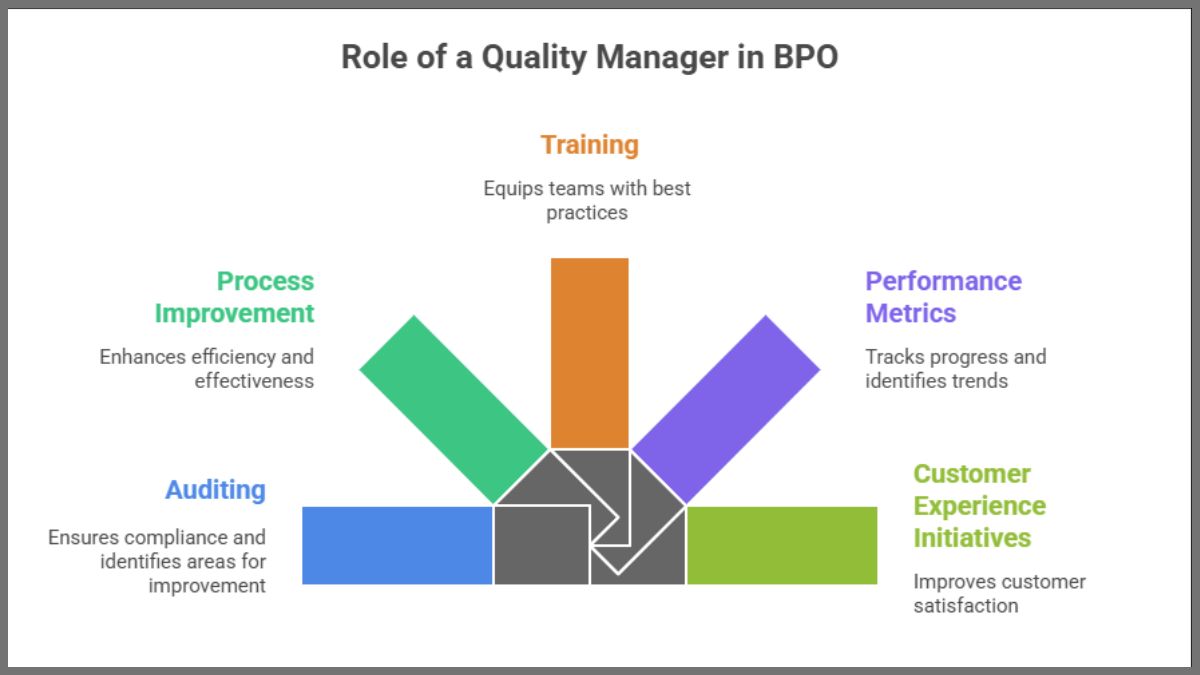Are you preparing for a job interview as a Quality Manager in a BPO (Business Process Outsourcing) company? Landing this role requires more than just technical know-how. Employers today look for candidates who can improve process efficiency, ensure quality assurance, and drive excellent customer experiences.
In this blog, we’ll walk you through some of the most common—and the most insightful—interview questions and answers for BPO Quality Manager. We’ll keep it simple, practical, and relevant to the current industry trends.
Let’s dive right in.
What Does a Quality Manager in BPO Do?
Before discussing the interview questions, it’s important to understand the role. A BPO Quality Manager is responsible for one main goal: ensuring that services delivered to customers meet high standards of quality.
Their daily responsibilities include:
- Auditing calls, emails, and chats for compliance and quality
- Identifying issues in processes and suggesting improvements
- Training teams to follow best practices
- Creating performance metrics and reports
- Driving initiatives to enhance the customer experience
Now that we’ve set the stage, let’s go through some key questions you’re likely to face—and how to answer them confidently.
Common Interview Questions and Best Sample Answers
1. Can you describe your experience with quality assurance in a BPO setting?
What they’re really asking: Have you worked in this environment before, and how hands-on are you?
Sample Answer:
“In my previous role at a telecom BPO, I led a team responsible for auditing over 500 customer calls monthly. I developed scorecards to track performance, improved error reporting processes, and collaborated with team leads to address training needs. Through these efforts, we improved our CSAT (Customer Satisfaction) scores by 15% over a six-month period.”
Pro tip: Mention specific tools like NICE, Verint, or CallMiner if you’ve used them.
2. How do you measure quality in a BPO process?
What they’re really asking: Do you understand quality metrics and how to apply them?
Sample Answer:
“I use a combination of KPIs like FCR (First Call Resolution), CSAT, NPS (Net Promoter Score), and AHT (Average Handle Time). For example, FCR helps measure how efficiently we resolve customer issues, while CSAT gives direct customer feedback. I usually create dashboards to track these metrics and identify red flags early.”
Did you know? According to a 2023 report by Deloitte, 68% of BPO firms use automated dashboards to track quality metrics in real-time.
3. Tell us about a time when you identified a process issue and improved it.
What they’re really asking: Can you spot inefficiencies and take initiative?
Sample Answer:
“I noticed that agents were frequently putting customers on hold to check information. After reviewing a sample of these calls, I saw a pattern: the knowledge base wasn’t user-friendly. I worked with operations to redesign it and offered refresher training. As a result, hold time dropped by 28% in the next two months.”
Employers love hearing real stories that show impact—it makes your answer memorable.
4. How do you ensure your QA team remains unbiased during evaluations?
What they’re really asking: Do you understand the importance of fairness and consistency?
Sample Answer:
“I ensure we follow standardized evaluation forms and that multiple reviewers listen to the same call for calibration. We also arrange weekly calibration sessions with team leads and QA analysts to compare results and address any inconsistencies. This keeps our scoring process fair and transparent.”
5. What quality tools or methodologies are you familiar with?
What they’re really asking: Do you have technical knowledge of tools and strategies?
Sample Answer:
“I’ve used Six Sigma and Lean principles to identify root causes and eliminate waste from processes. For example, I applied a DMAIC framework to reduce error rates in data entry processes. On the tool side, I’m experienced with QA tools like NICE Engage and CRM dashboards like Salesforce.”
Bonus tip: If you’re certified in Six Sigma or Lean, don’t forget to mention it. Certificates still matter in 2025!
6. What’s the role of feedback in your QA process?
What they’re really asking: Can you coach effectively?
Sample Answer:
“Feedback is key to growth. I always use a constructive approach—first highlighting what the agent did well, then discussing areas for improvement. I also make sure to back recommendations with call examples. Regular one-on-one sessions help agents feel supported and motivated.”
People grow with good feedback—and managers who understand that are a big asset.
7. How do you handle underperforming team members?
What they’re really asking: Are you willing to address performance issues directly but fairly?
Sample Answer:
“I first try to understand why performance dipped—whether it’s a skill gap, engagement issue, or workload problem. Then, I build a performance improvement plan with clear goals and timelines. I’ve found that giving people a roadmap and ongoing support usually works better than quick disciplinary action.”
8. What current trends in BPO quality management do you follow?
What they’re really asking: Are you staying updated with industry changes?
Sample Answer:
“One exciting trend is the use of AI in real-time QA monitoring. Tools like Observe.AI and Level AI can now provide instant feedback during customer interactions. I also keep up with customer experience strategies via publications like CX Network. With customer expectations rising, real-time quality checks are transforming how we manage QA.”
According to Grand View Research, the AI in customer service market is expected to grow by 21.3% annually through 2027.
Additional Tips to Nail the Interview
Here are a few last-minute pointers that could give you an edge:
- Be data-ready: Bring in metrics where possible. Numbers speak louder than words.
- Know your tools: Be comfortable talking about QA and analytics platforms.
- Practice coaching scenarios: These often come up in role-play interviews.
- Stay current: Mention recent trends like AI monitoring, remote QA, and customer journey analytics.
Along with preparing your answers, don’t forget to dress for success. Check out this interview outfit guide for men to make a great first impression.
Final Thoughts
Interviewing for a BPO Quality Manager position can be a challenging yet exciting step in your career. By preparing thoughtful answers to these common questions, you’ll show hiring managers not just what you know—but how you think. Remember, they’re looking for someone who is not only analytical and process-focused, but also people-oriented and customer-obsessed.
With the BPO industry rapidly embracing digital transformation, there’s no better time to showcase your understanding of both people and performance. Good luck! You’ve got this.
If you’ve got any questions or want to share your own interview experience, drop a comment below—we’d love to hear from you!





